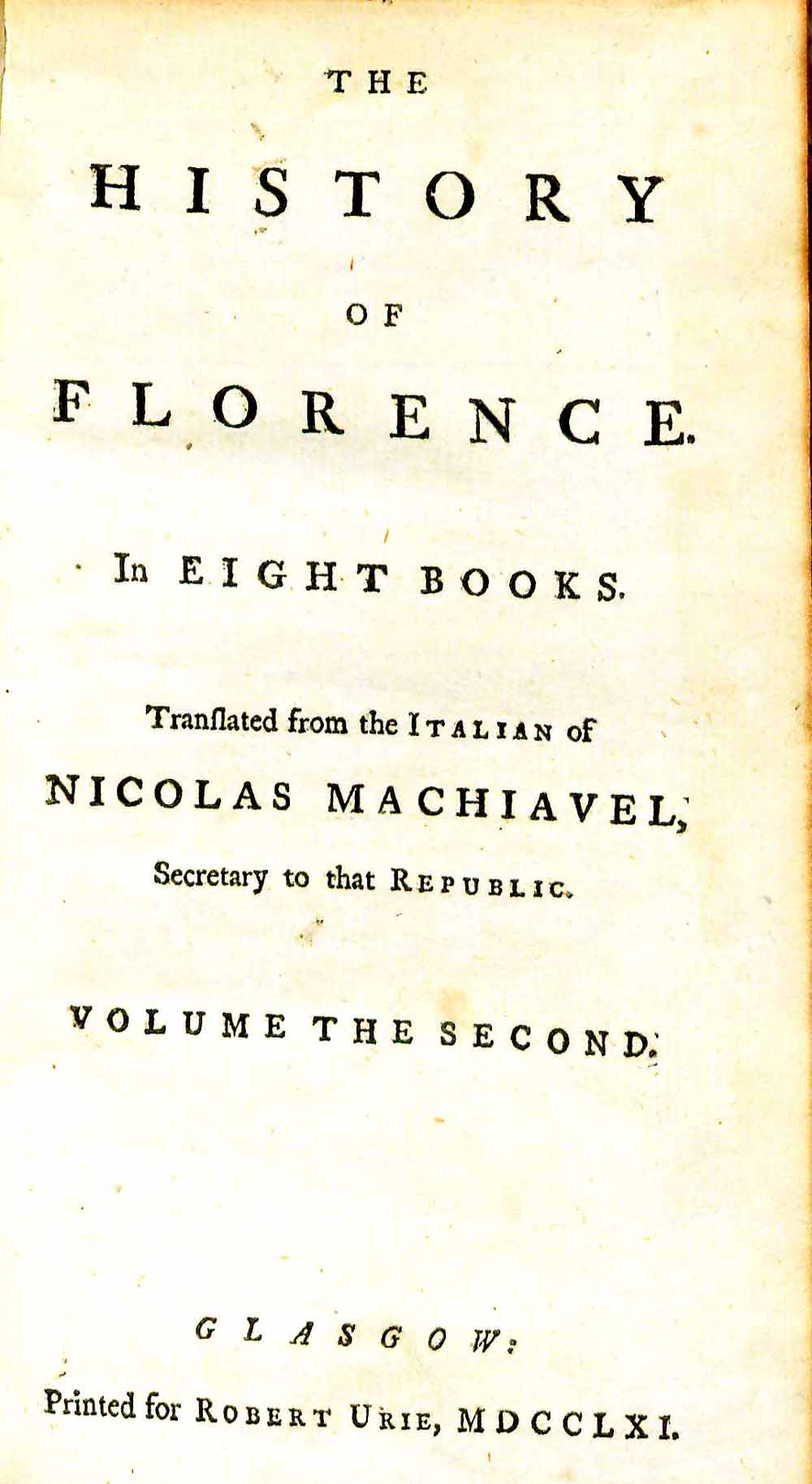The History of Florence: in Eight Books
by Niccolò Machiavelli
| The History of Florence | |
|
Title page from The History of Florence, volume two, George Wythe Collection, Wolf Law Library, College of William & Mary. | |
| Author | Niccolò Machiavelli |
| Published | Glasgow: Printed for Robert Urie |
| Date | 1761 |
| Language | English |
| Volumes | 2 volume set |
| Desc. | 12mo (18 cm.) |
| Location | Shelf C-1 |
The Florentine Histories consist of eight volumes that detail the shaping of the city-state of Florence. They were printed in 1532 and written by Niccolo Machiavelli. Machiavelli was born in 1469 in Florence, where he spent most of his life. A politician, diplomat, and historian, he held high offices in the Republic of Florence. When the Medici returned to power, Machiavelli fell into disgrace and turned to them in hopes of saving both his own career and Florence.
Machiavelli sought the commission to write the Florentine Histories and was granted it by Cardinal Giulio de’ Medici, later Pope Clement VII.[1] The Histories begin with the fall of the Western Roman Empire and end with the death of Lorenzo Il Magnifico. The Florentine Histories were Machiavelli’s study of the Republic and reveal his desire to see it brought back. He found that “as one such citizen of a ruined republic, having understood in historical terms the process of that ruin, he now looks to those very misfortunes, indeed to the history that he and the republic had suffered, as the beginning of wisdom, and from an understanding of which new life would become possible.”[2] Taken as whole, the eight volumes seem to draw the conclusion that in order for the Republic to be brought back it would have to rid itself of the Medici.[3] Not surprisingly, the Medici accused him of conspiracy and had Machiavelli arrested, tortured and exiled to his estate at Sant'Andrea in Percussina. Machiavelli died there in 1527.
The History of Florence became significant in the eighteenth century as the American colonies were striving for their independence and looking to create their own republic. The founders would knowingly, and in some cases unknowingly, espouse the ideals of a republic that Machiavelli championed centuries earlier. “Jefferson’s commitment to limited government, his advocacy of a politics of distrust, his eager embrace of a species of populism, his ultimate understanding of the executive power, and the intention guiding the comprehensive legislative program that he devised for Virginia make sense only when understood in terms of the new science of republic politics articulated by Machiavelli.”[4] Unlike Jefferson, who just shared some of Machiavelli’s ideas, John Adams “actually read and took seriously Machiavelli and his writings,” and “he copied over one-hundred pages from the Florentine Histories” for the second volume of A Defence of the Constitutions of Government of the United States of America.[5] In the Defence, Adams “retraced Machiavelli’s history of Florence, attributing its unrelenting sequence of political tragedies to its failure to incorporate the mixed constitution, a point Adams repeatedly belabored Machiavelli for missing.”[6] Machiavelli’s History of Florence, an important work during his time, continued to be important centuries later as it helped shape the minds of men creating a new republic.
Evidence for Inclusion in Wythe's Library
Listed in the Jefferson Inventory of Wythe's Library as Machiavel. and given by Thomas Jefferson to his son-in-law, Thomas Mann Randolph. Later appears on Randolph's 1832 estate inventory as "'Marchiavel's Works' ($4.00 value)." We do not have enough information to conclusively identify either which title Machiavelli authored nor which edition, Wythe owned. George Wythe's Library[7] on LibraryThing indicates this, adding "Probably a collection of Machiavelli's works, but the language and format are not indicated." The Brown Bibliography[8] lists the 1761 Glasgow edition of The History of Florence in Eight Books based on a copy at the University of Virginia with the signature "Thomas M. Randolph" inside the front board of volume two. The Wolf Law Library agreed with Brown's reasoning and purchased the title and edition he suggested.
Description of the Wolf Law Library's copy
Bound in contemporary full brown calf with raised bands and red leather spine labels printed in gilt. Purchased from Royoung Bookseller, Inc.
Images of the library's copy of this book are available on Flickr. View the record for this book in William & Mary's online catalog.
See also
References
- ↑ John M. Najemy, "Machiavelli and the Medici: The Lessons of Florentine History," Renaissance Quarterly 35, no. 4 (1982): 553.
- ↑ Najemy, "Machiavelli and the Medici," 576.
- ↑ Ibid.
- ↑ Paul A. Rahe, "Thomas Jefferson's Machiavellian Political Science," The Review of Politis 57, no. 3 (1995): 449.
- ↑ C. Bradley Thompson, "John Adams's Machiavellian Moment," The Review of Politics 57, no. 3 (1995): 390.
- ↑ Andrew J Reck, "The Enlightenment in American Law II: The Constitution," The Review of Metaphysics, 44, no. 4 (1991): 740.
- ↑ LibraryThing, s.v. "Member: George Wythe" accessed on November 13, 2013.
- ↑ Bennie Brown, "The Library of George Wythe of Williamsburg and Richmond," (unpublished manuscript, May, 2012) Microsoft Word file. Earlier edition available at: https://digitalarchive.wm.edu/handle/10288/13433.
